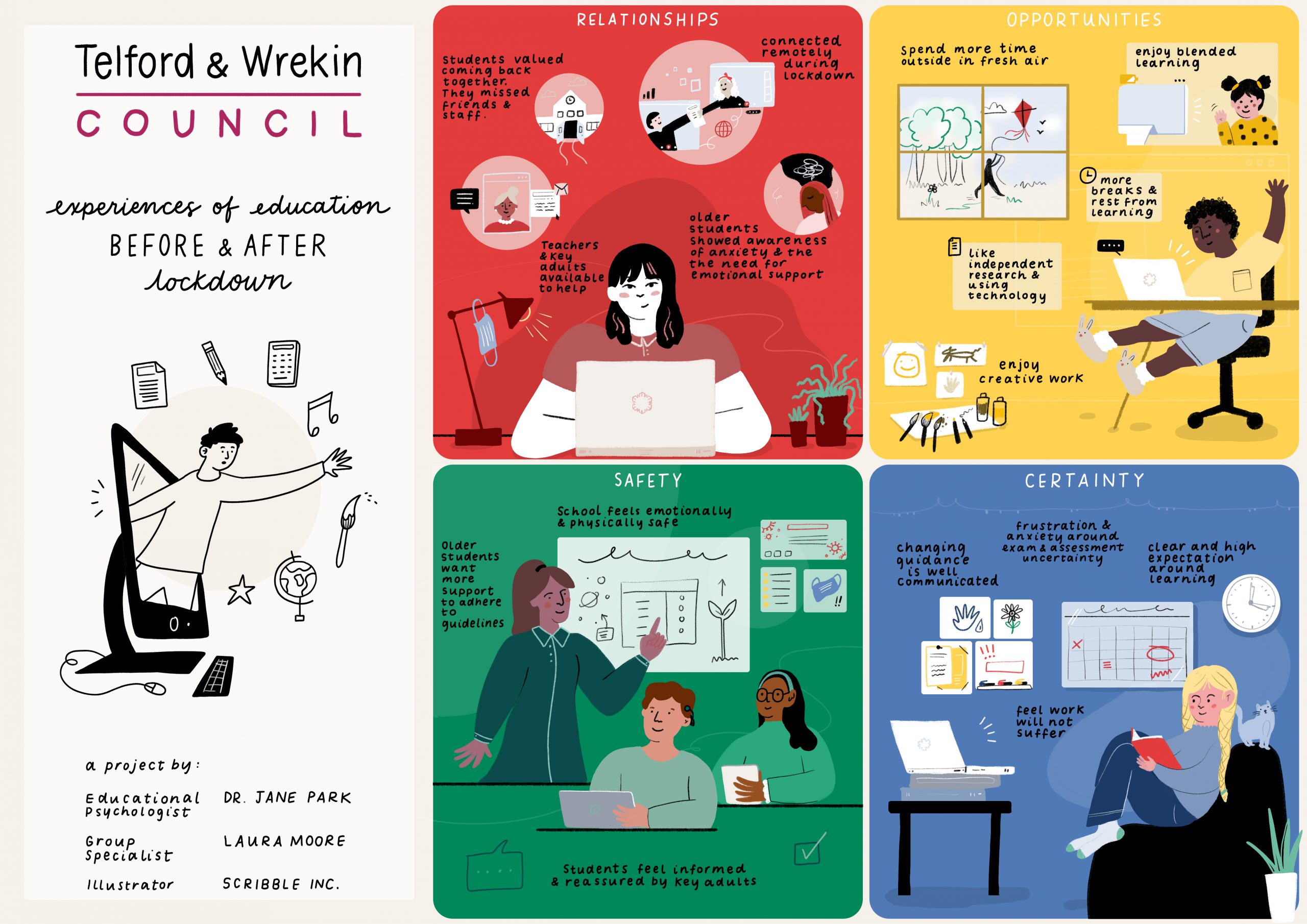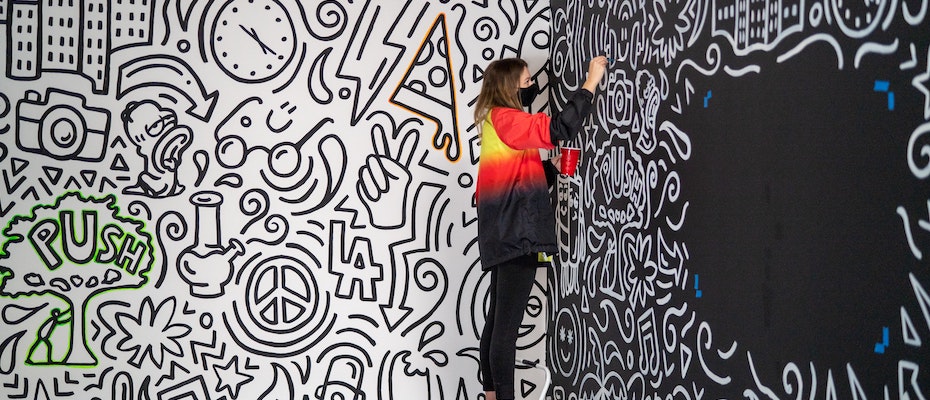This collaborative project was devised by Hannah Williams and Dr Jane Park to enable the views, thoughts, feelings and experiences about the coronavirus pandemic of children and young people across Telford & Wrekin to be heard.
In November and December 2020, we facilitated workshops with small groups of children and young people in Telford schools across the age range from Year 2 all the way to tertiary education and specialist settings. Small groups of pupils shared their views and experiences, which were live scribed by Hannah in real time.
We then prepared a report to enable us to share these ideas with schools and colleagues to support them in making plans to welcome children and young people back following the current lockdown. It has also been produced as a reflection of the children’s thoughts, and to acknowledge that they have been heard. It was powerful and humbling to hear of the joys and difficulties of the children’s experiences through lockdown, and a pleasure and privilege to share those thoughts and present their ideas.
Questionnaires and Workshops
We drew on a set of questions which emerged from the work of Southend EPS and Nottingham City EPS in their larger scale pupil views project which ran in May to July 2020 (Popoola et al, 2020). We wanted to know more about what life has been like for Telford children, and to deepen our understanding of protective factors for emotional health and wellbeing (EHWB), as well as all the challenges which our children and young people have faced.
Working with groups of children across all Key Stages including tertiary, and across mainstream and specialist settings, our workshops drew out experiences, thoughts and feelings around the following key areas:
- How was going back to school/college following lockdown?
- Was it like you expected it to be?
- How does being back in school make you feel?
- If you have a problem in school/college is there an adult you can talk to?
- If you have a problem in school/college do you have a friend you can talk to?
- Do you feel your school/college is a safe place to be?
- Do you feel supported in your learning?
- Thoughts about the things our children & young people are learning at the moment
- Thoughts about exams and assessments
- ‘Magic wand’ question – what would you do to change or improve school/college? What would you do differently and what would you keep the same?
Drawing children’s views of education before and after lockdown

Hannah’s reflections on the workshops and working with an EP
Working with Jane on our workshops was inspiring. I have seen first-hand how powerful it is to truly listen to young people, and action their authentic voice. The questions Jane asked encouraged collaboration and discussion, creating a safe space to share ideas and experiences, which was integral to the live scribed drawings I created.
Live Scribing is the act of drawing information in real time, often at a large scale for participants to watch the illustrations come to life. As these are a creation of the information and ideas discussed, themes can be more easily identified visually, and a sense of storytelling can increase engagement, therefore stimulating a more impactful session.
Drawing the genuine emotions and responses from the young people was incredibly moving, and the positive feedback from across the age ranges served as a powerful reminder of how important it is to actively listen to their experiences. Live scribing can be a powerful and effective means of capturing voices and views, as it turns floating thoughts into tangible concepts.
The drawings were kept by the schools and displayed as a reminder for young people of the power they have, and their ability to voice opinions.
Because of the changing situation with Covid, we were not able to deliver workshops face to face for all our schools and settings. For the schools we were not able to attend in person, Jane facilitated the workshops over Teams virtually. Adapting to drawing virtual events has been a learning curve over the last 12 months for me! Although it may bring about its own challenges, the sessions over Teams were just as successful, and perhaps the drawing element encouraged that sense of active listening as we joined remotely. By sharing my screen throughout the event, young people could watch the drawing come to life and interact with comments and feedback.
A small hope for me is that when young people see art and creativity being used to support nationwide projects, they see the importance of their own creative learning journey, and enjoy finding effective learning styles that serve them.
Jane’s reflections on working with a live scribe artist
Working with Hannah was such a joy – we hadn’t met in person before the first workshop with a small group of Year 5 pupils, but in contracting the project over Teams, we had developed a clear shared understanding of the hopes and aims of the project, so the process of working together felt natural and organic.
It was such a privilege to facilitate the views of so many children, who expressed the view that they appreciated having their voices and perspectives heard. In our workshops, I drew out the young people’s experiences and views, while Hannah live-scribed them in front of the children’s eyes – they loved this process, and it was so exciting to see their thoughts come alive through Hannah’s art.
Themes
Relationships
Relationships and connectedness were powerful themes which ran across the views shared by the children and young people who we worked with. Children and young people in Telford & Wrekin told us:
- There are key adults in their lives that they can go to for help and assistance
- They have missed seeing members of staff and friends/family members in other year groups as a consequence of being educated in ‘bubbles’
- School and college staff have enabled children to stay connected remotely during periods of lockdown.
- Pupils feel they have missed out on being able to look after and mentor their younger peers, and miss being able to socialise freely at break and lunchtimes.
- Older students lamented the abruptness of endings, not having been able to say goodbye to peers in Year 6 or Year 11 as they moved on.
Older students presented as caring and attuned peers, recognising that others may be struggling with the pandemic context, and demonstrating awareness that anxiety might manifest in challenging ways, such as defiance or emotional outbursts. They also expressed appreciation for teaching staff making themselves easily available for learning and emotional support via email or through Teams.
Opportunities
Children and young people in Telford & Wrekin told us:
- They enjoy blended learning opportunities, and have liked being able to spend time outside in the fresh air.
- They have enjoyed doing lots of creative work, and enjoy opportunities for independent research and working using technology when in school.
- Younger Key Stage 1 pupils expressed their love for all aspects of learning, while those in Key Stage 2 sought more opportunities for hands-on creative experiences such as through Science, Art and activities such as sport and cookery.
- Across the age ranges, Telford & Wrekin pupils expressed wishes for breaks from learning and opportunities for rest and relaxation away from the stresses and uncertainties they have been experiencing, whether in school or at home during periods of self-isolating.
- Uniform was raised across age ranges – children like to be comfortable, and while they communicated an insightful understanding about the significance of school uniform, they also expressed their enjoyment of wearing comfortable clothing such as sneakers as part of their uniform.
Safety
Across all age ranges, children and young people in Telford & Wrekin let us know
- School staff have created an environment in which they feel emotionally and physically safe.
- They feel informed about what is happening to them, and reassured by the key adults in their lives.
- Worries about spreading the virus to family members were expressed, though the collective view is that schools are safe.
- All the children understood the need for additional measures such as handwashing and not mixing across bubbles, though many wished for a return to simpler times when such measures were not needed.
- Alongside practical measures such as hand sanitising and washing, children felt that friends, family and teachers will support them and keep them safe.
Older students expressed some frustrations at rules around social distancing and wearing masks around the school environment not always being adhered to, and appreciated the challenges for staff members in trying to encourage adherence to guidelines.
They expressed how important it felt to have a clear picture of how government guidance applies to them, and the measures which each school needs to have in place. Some older students were keenly aware of the impact of the pandemic context on their home lives, with pressures on parental work patterns and job losses causing them anxiety.
Certainty
Children and young people in Telford & Wrekin let us know that they feel supported and informed by school staff. Guidance, though ever changing, is well communicated, and they all appreciate knowing what is going to happen when they return to school. Expectations around learning were felt to be high, but also clear.
Older students appreciated the efforts of their teachers to support their learning, especially during periods of self-isolation, and felt that their work would not suffer. Older students also expressed frustration and anxiety at not knowing where they stood regarding examinations/assessments at the end of Year 13.
Concluding Observations
Hannah and Jane would like to thank the children and young people of Telford & Wrekin once again for sharing their thoughts and experiences so generously. We hope that everyone enjoyed taking part in the Live Scribe experience, and hope that you feel that we heard your voices and views, and that the adults around you are listening and acting on what you have told us.
With sincerest thanks and due acknowledgement of the work of EP colleagues across England, especially Dr Maddi Popoola & Dr Sarah Sivers.

